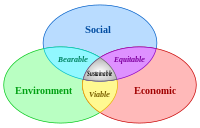
Photo from wikipedia
Abstract A great number of tools that assess sustainability exist. The analysis of 18 urban sustainability indices and 7 urban sustainability systems of indicators that satisfy the research criteria, reveals… Click to show full abstract
Abstract A great number of tools that assess sustainability exist. The analysis of 18 urban sustainability indices and 7 urban sustainability systems of indicators that satisfy the research criteria, reveals a great variation in terms of variables used to express the level of sustainability and an unbalanced reflection on the ‘’traditional’’ dimensions of sustainability. Tools are often applied at any scale, not respecting the initial level of design, disabling the introduction of thresholds. The paper, attempts a cross-cutting research in the area of urban design and planning, through the reinforcement of continuous monitoring and mainstreaming of sustainability policies, based on real data. It compiles variables composing the tools. Indicators are aggregated and reflection to the ‘’traditional’’ dimensions of sustainability, is revealed. The aim is to propose a set of commonly accepted indicators, through the implementation of an innovative ‘’meet in the middle approach’’ that leads to the characterisation of sustainability in European urban areas. This is attempted through a top-down approach that leads to a set of indicators that meet certain criteria and the integration of experts’ viewpoint (bottom-up). The paper prepares the ground for an index that will bridge the gap between sustainability assessment tools and holistic characterisation of cities.
Journal Title: Sustainable Cities and Society
Year Published: 2018
Link to full text (if available)
Share on Social Media: Sign Up to like & get
recommendations!